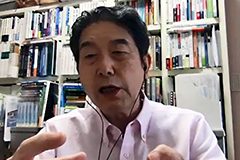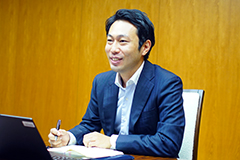Innovation and the Future of Energy Policies From a Business History Perspective: A Dialogue With Distinguished Fellow Kikkawa Takeo
2021.12.14
“The role of business history is to carefully look at issues over a long historical timeline and discover gaps between theory and reality so that more practical solutions could be found,” Kikkawa Takeo, distinguished fellow at the JICA Ogata Sadako Research Institute for Peace and Development (JICA Ogata Research Institute) and also a professor at the International University of Japan, says in his interview with Tanaka Tomoaki, then research fellow of the JICA Ogata Research Institute. Kikkawa talked about the roles JICA must play in future international cooperation in innovation and energy policies, from the perspectives of Japanese business history, his area of expertise.
Tanaka: In your book, "Innovation no Rekishi (the Japanese book is tentatively translated as The History of Innovation)," you categorized innovation into three types—breakthrough, incremental and disruptive—and captured and analyzed the achievements of Japanese entrepreneurs from the 17th century onwards with the perspective of this categorization over a long-term historical timeline. From such a perspective, what kind of innovation do you think may take place in Japan and around the world in the future?
Kikkawa: Incremental innovation, that is, imitation and improvement, served as the driving force for growth among Japanese companies. The underlying strategy was that of a latecomer’s advantage, meaning that those who entered the market later were more competitive. As we entered an era of first-mover advantage brought about by breakthrough innovations from Silicon Valley, based on the ICT (information communication technology) revolution, however, Japanese companies faced difficulties. Moreover, developing countries have the additional option of disruptive innovation (i.e., innovation that disrupts values of established products and creates a completely new set of values). I believe it is important to become the bearer of this type of innovation.
Tanaka: According to your book, disruptive innovation is ongoing in Asia. Meanwhile, we have seen technological leapfrogging in some parts of developing countries where novel services are rapidly spreading because of the lack of accessible established infrastructure. Such technologies have enabled them to skip the stages of development that advanced countries had gone through. When I was posted in Mongolia, nomads leading traditional lifestyles in the widespread steppes were traveling with solar panels and setting up satellite dishes on top of their gers (traditional portable houses) to watch TV and used smartphones to access social media. Seeing this in person, the concept of developing countries changed for me.

Some nomads in Mongolia are traveling with solar panels to watch TV and use smartphones
Kikkawa: I think that example from Mongolia is very indicative. Cell phones are symbolic to this idea of “decentralization.” In many developing countries, landlines were not available so they were skipped altogether and the use of cell phones spread first. When we look at the field of energy, the use of liquefied petroleum gas (LPG) is rapidly expanding in Asia now, most notably in Indonesia. This is because it is difficult to develop infrastructure like gas pipes when significant urbanization has already progressed. After the Great East Japan Earthquake, Japan is also trying to introduce decentralized energy systems, in addition to traditional centralized energy systems that rely on large power stations, but developing countries are actually ahead of Japan, skipping historical stages. The systems that Japan needs to introduce are already available in developing countries. Japan can no longer behave as if it is the one who teaches them.
Tanaka: In Africa, mobile money services using cell phones have been available from an early stage. There are many cases where these services are leveraged with added values, going ahead of developed countries.
Kikkawa: When Japan offers cooperation to developing countries, it should be aware of the fact that the development of infrastructure like power transmission lines is certainly important, but assistance for digital transformation (DX) is also important in a world of decentralized energy systems. Furthermore, assistance for blockchain (decentralized digital ledger) technology for privacy protection would become necessary as well. This is an area where Japan itself needs to make further progress. Estonia is seen as the most advanced country in this area. I am hoping that JICA will start to learn the latest technology from advanced country’s practices and share it with developing countries.
Tanaka: JICA has currently provided assistance to induce innovation, focusing on human capacity building for entrepreneurs in developing countries. What are the points JICA especially needs to pay attention to in such capacity building efforts?
Kikkawa: There are two types of developing countries. The first type owns natural resources abundantly but is not making use of them, while the second type has an abundance of human resources that they are not utilizing. For a country to develop, it is important to nurture industries that produce highly added value products. The secondary sector, that is, manufacturing industries, is by far the best at doing this. For countries rich in natural resources, the key would be to shift to processing resources and adding values before exportation, instead of exporting them as they are. It is also important to develop a mechanism that connects those who have the money with businesses as their investors and allow financial and human resources to successfully flow into value-adding businesses. This indeed is “gappon shugi (ethical capitalism),” a concept proposed by Shibusawa Eiichi, a Japanese industrialist, known as the father of Japanese capitalism. I think JICA can create such mechanisms and act as a bridge by connecting vibrant small and medium-sized enterprises (SMEs) based in provincial areas of Japan with developing countries.

Kikkawa Takeo, distinguished fellow at the JICA Ogata Research Institute
Tanaka: I saw a considerable number of entrepreneurs in Mongolia wanting to collaborate with Japanese companies. JICA is supporting and researching projects that leverage the technologies available at Japanese SMEs in problem solving, and I hope these projects can lead to solving social issues.
Kikkawa: It is quite difficult for Japanese SMEs, especially those involved in manufacturing, to become connected with developing countries by themselves. Although it is common for Japanese SMEs, often family-run businesses, to make their future successors first work at large enterprises to gain experience through work, maybe it would be more beneficial for them if they make them work in developing countries. At the end of the day, this may contribute to the revitalization of Japan. I think the role to provide the connections could only be fulfilled by JICA.
Tanaka: Once the full implementation of the Paris Agreement starts, developing countries are expected to change their energy policies. And they must deal with various challenges, such as the gap between the infrastructure in demand and the available funding, and the need of reforms around fossil fuel subsidies. Amid these challenges, however, innovations like off-grid solar power systems are being developed. What is your take on the direction developing countries should take in the coming years?

Tanaka Tomoaki, then research fellow of the JICA Ogata Research Institute
Kikkawa: For our planet and for future generations, carbon neutrality (decarbonization) is a must. There are limits to the extent that developed countries can contribute to it, so it is critical to involve developing countries in this effort. In doing so, we should notice the fact that the Sustainable Development Goals (SDGs) themselves contain some contradictions. Goal 13 (Climate action), for example, aims to “take urgent action to combat climate change and its impacts” while Goal 7 (Affordable and clean energy) aims to “ensure access to affordable, reliable, sustainable and modern energy for all.” As coal is affordable for many people, it could be an ideal energy source “for all.” However, since coal is not “clean,” it tends to be a target of criticism in climate change discussions, and therefore would unlikely be an option in this context. This is precisely what JICA’s energy assistance in developing countries must confront. Among a few others, I would like to share Japan's approach in carbon neutrality. It proposes to start by co-firing ammonia with coal in coal power plants, and gradually shifting to firing ammonia only in the end. This approach, which aims to shift to carbon neutral energy while making the most of existing coal power plants, does not exist in Europe or in North America. It will require time, but I think it is a very realistic approach. If Japan manages to leverage such unique ways, it is possible for the country to become a front runner in this area by 2050.
Tanaka: Electric power providers in developing countries are required to improve their business management as well. In what ways do you think Japan’s experience may be useful?
Kikkawa: There are two key points here: first, whether they can foster the relationship between the national government and the private sector, and second, whether they have the mechanism for decentralization. Japan has accumulated experience in the former. When we look at the Japanese history of electric power services over about 140 years, they were state-managed for only 12 years. Japan’s experience of providing public utility services like electricity mostly through the private sector is globally rare. What is most important here is to pursue the delivery of cheap and stable power supply by leveraging the vitality of companies. Japan does face many challenges, but I think there are many things that Japan can share with other countries. On the other hand, it is difficult to find successful models of decentralized power supply systems in Japan. So, it is important for us to share technologies and experiences that are still not fully developed with developing countries and co-develop them. I believe JICA needs to play a role in finding pioneering trends in Japan and/or developing countries and disseminating them.
Kikkawa: Over the years, I have been active in the academic field of business history, including studies on power generation and supply. If theories in economics and business administration were correct, no problems would emerge in the economy of corporates and countries. Yet in reality, there are gaps that emerge and cause problems. It is precisely here where business history is applied, investigating why such gaps emerged and unravelling what the underlying problems are through a historical approach. I see myself more as a social activist than a scholar. Empirical analysis is crucial in academic studies. My role is to point out the problems without fear of criticism and propose solutions that are practical and useful to make the world a better place.
Tanaka: As I specialize in economics, I make sure to analyze policies in an objective manner, based on data and calculations. I would like to engage in my studies with a field-oriented perspective and contribute to solving global issues.

事業事前評価表(地球規模課題対応国際科学技術協力(SATREPS)).国際協力機構 地球環境部 . 防災第一チーム. 1.案件名.国 名: フィリピン共和国.

事業事前評価表(地球規模課題対応国際科学技術協力(SATREPS)).国際協力機構 地球環境部 . 防災第一チーム. 1.案件名.国 名: フィリピン共和国.

事業事前評価表(地球規模課題対応国際科学技術協力(SATREPS)).国際協力機構 地球環境部 . 防災第一チーム. 1.案件名.国 名: フィリピン共和国.

事業事前評価表(地球規模課題対応国際科学技術協力(SATREPS)).国際協力機構 地球環境部 . 防災第一チーム. 1.案件名.国 名: フィリピン共和国.

事業事前評価表(地球規模課題対応国際科学技術協力(SATREPS)).国際協力機構 地球環境部 . 防災第一チーム. 1.案件名.国 名: フィリピン共和国.
scroll